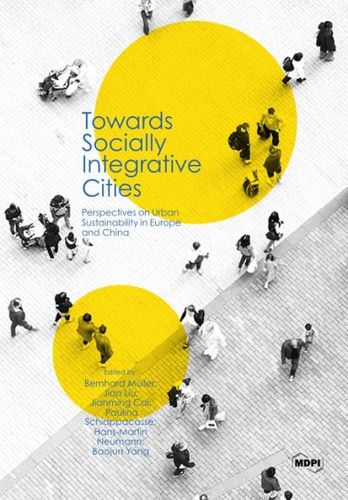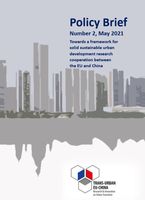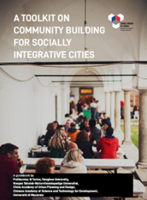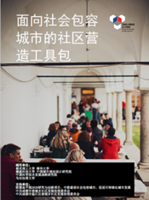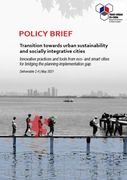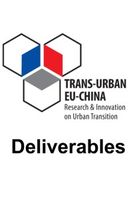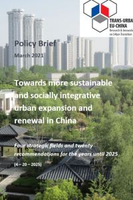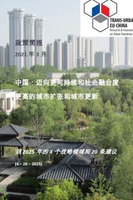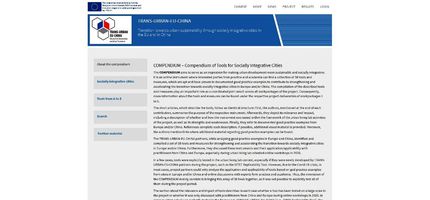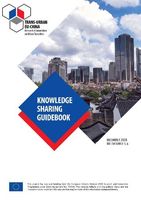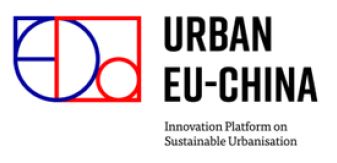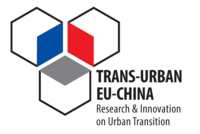
TRANS-URBAN-EU-CHINA
Transition towards urban sustainability through socially integrative cities in the EU and in China
Welcome to TRANS-URBAN-EU-CHINA -
Transition towards urban sustainability through socially integrative cities in the EU and in China
Challenges
Cities are places of social innovation and engines of economic growth. However, they are often also social hotspots where social integration is directly linked with economic prosperity. This is true for cities in Europe and China but especially relevant for China. The country is rapidly transitioning from a less urban to a more urbanised society. One of the greatest challenges Chinese urbanisation is facing is how to best design and turn cities into socially integrative and sustainable environments.
Objectives
On this background, TRANS-URBAN-EU-CHINA aimed to help policy makers, urban authorities, real estate developers, public service providers and citizens in China to create socially integrative cities in an environmentally friendly and financially viable way. Moreover, it aimed at helping urban stakeholders in Europe to increase their knowledge about urban development in China and to reflect their own approaches towards sustainable urbanisation.
Products
In order to fulfil these objectives, TRANS-URBAN-EUCHINA developed a systematic knowledge base on experiences regarding socially integrative cities in Europe and China, and made key results publicly available as a book. Furthermore, the project consortium provided a compendium of respective tested tools and measures to support the transition towards socially integrative cities. Finally, related recommendations were elaborated.
Activities
During the duration of the project (01.01.2018-30.06.2021), the TRANS-URBAN-EU-CHINA consortium, coordinated by the lead-partner institution TU Dresden, conducted the following activities:
- An internal Concept Group developed a common understanding of the main concepts and terms used in the project and defined the socially integrative city. This was especially useful because of the different cultural backgrounds of partners and the differences in the use of terms and concepts in both parts of the world.
- A book with the title “Towards Socially Integrative Cities – Perspectives of Sustainable Urbanisation in Europe and China” was elaborated. It shares original research results of the project. The book brings results of the project together. It consists of 15 chapters, written by joint European-Chinese teams.
- All planned reports were submitted to the European Commission. They are stand-alone texts. They served as inputs for the book and other products, such as the elaboration of a compendium and policy briefs.
- A compendium of tools for the transition towards socially integrative cities was elaborated. It comprises the definition of socially integrative cities, thirty tested tools which have proven to be useful in a number of cities in Europe and China, good practice examples, and further references for reading.
- Policy briefs as well as guidelines for cities, storylines and recommendations regarding the transition towards socially integrative cities were elaborated. They contain a number of practical suggestions for strengthening urban sustainability. They have been discussed with experts from practice, academia and the civil society in both parts of the world.
Topics
The topics which are covered by the products of the project, are related to the following subjects:
- Community building and place-making in neighbourhoods: Research results include an overview over good practice examples in Europe and China, and a glossary of significant examples related to urban design approaches that can contribute to creating socially integrative neighbourhoods and cities, as well as related recommendations regarding applicable tools for creating socially integrative neighbourhoods.
- Bridging the planning-implementation gap in eco- and smart cities: Research results give insights into good practice and success factors for the development of strategies for sustainable cities in China and Europe. Special reference is made to transition and transformative capacity. Recommendations are summarised in a Policy Brief.
- Land use planning and land management: Research contributes to increasing the knowledge about the current trends of urban renewal, urban expansion, and land management in China and Europe. The socially integrated city and its features as defined by the project, are especially addressed. A Policy Brief addresses Chinese urban policies and decision-makers.
- Integrated transition pathways towards sustainable urban planning and governance: Among other things, research dealt with developing information about pathways towards socially integrative cities, the internalisation of external costs of urban development and the digitalisation of urban development processes, including evidence-based decision-making and the digital communication in local communities.
- Urban Living Labs and feedback between cities and researchers: Results include conclusions regarding the applicability of the Urban Living Lab approach in Europe and China, based on related activities in Chinese cities, such as Wuhan, Chengdu, Jingdezhen, Tianjin and Xiong’an. Moreover, cities in Europe and China were motivated to participate in the discussion about project results.
Impact
The findings from TRANS-URBAN-EU-CHINA were discussed with representatives of a large number of cities and a wider stakeholder community in Europe and China. Policy briefs, guidelines, and good practice examples for the development of socially integrative cities and for strengthening transformative processes were developed and disseminated in Europe and China.
Policy oriented government institutions and high-ranking research institutions in China, such as CAUPD, CCUD, CASTED, CAS, THSA and CIUC, have participated in the project. They have direct influence on decision-making and further research. Major products of the project are available in English and Chinese, and they specifically address a Chinese audience. It can be expected that through these organisations and their networks project results will have considerable impact.
In Europe, EUROCITIES has had an active role as a partner in the project. The European Policy Briefs have provided policy relevant knowledge for the European Commission. It is related to recent trends in sustainable urbanisation in China and social integration in cities. Moreover, the research cooperation experience between European and Chinese partners is reflected.
Results and recommendations have been discussed in a Policy Round Table with representatives from various General Directorates of the European Commission. It is hoped that the results of these discussion will nurture future research cooperation between the European Union and China.


